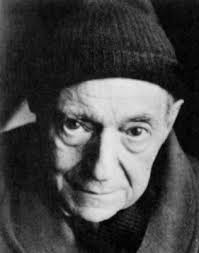 Born in Trieste in 1883, Umberto Saba was a poet and novel writer who would grow up to be one of the major Italian literary influences of the 20th Century. His father converted to Judaism to marry his mother shortly before Saba was born but was quick to abandon the family, leaving Saba to be brought up by a Catholic wet-nurse.
Born in Trieste in 1883, Umberto Saba was a poet and novel writer who would grow up to be one of the major Italian literary influences of the 20th Century. His father converted to Judaism to marry his mother shortly before Saba was born but was quick to abandon the family, leaving Saba to be brought up by a Catholic wet-nurse.
This abandonment would be an ever present issue in his later poetry as he tried to counterbalance the freedom loving attitude of his father and the restrictions of his home in the Jewish quarter of Trieste. From early on he was a veracious reader but, although he went to college in Trieste, he was not considered the most gifted of students.
Once he graduated, Saba went to work as a customs agent but found the employment not to his liking and took to writing instead. He made many friends among the local artists and traveled to places like Pisa trying to immerse himself in the history of poetry in Italy. He began to publish a number of articles and poems in Il Lavoratore which was edited by a friend of his, Amadeo Tedeschi.
In 1905, Saba traveled to Florence where he first encountered his father and also met his future wife Lina Wölfler. After a period of military service, he married her in 1909 and had one daughter by her in the following year. Saba’s first collection, Poesie, came out in 1910 and his success began to grow. However, when he was away in 1911, Lina had an affair and the couple separated for a while.

Despite his fame growing, there was little money to speak of and, by 1914, the family had moved to Milan where Saba earned a living as a secretary and working in a nightclub. He wrote a little for Mussolini’s newspaper Il popolo d”Italia and was conscripted during the war, but saw no action.
His luck changed for the better in 1919 when he returned to Trieste and purchased a second hand book shop that allowed him to provide a living for his family. In 1921 he wrote Songbook and had enough money to self-publish it, leading to his most prolific writing period over the next decade. He published collections such as Prelude and Songs and the book The Prisoners during this time.

With the rise of the fascist government and the impending war in Europe, in 1939 Saba tried to make himself exempt from the laws that had been created against Jews in the country. He was, however, unwilling to convert to Christianity and spent much of the war moving from place to place, often spending time in hiding.
At the end of the war, Saba returned to Trieste, was awarded the Viareggio Prize and published some of his last works including Mediterranean and Last Things. Throughout his life, he had suffered from bouts of serious depression and was prescribed opium for it in 1950, something that caused him to become quickly addicted. After receiving a doctorate from the University of Rome in 1953, he had a heart attack in 1957 and died at the age of 74.

